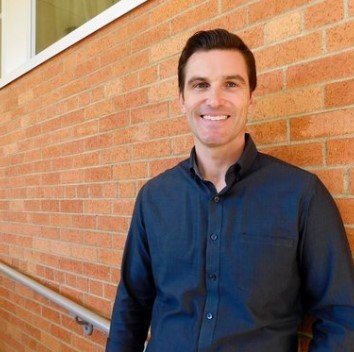Story by Kacie Frederick. Photos by Jan Osborn.
Almost 5,000 individuals currently experience homelessness in the Dallas-Fort Worth Metroplex. As these statistics continue to rise, Texas Health Resources has committed to curating a roadmap of second-chance hiring to help these individuals get back on their feet. Under the jurisdiction of Mr. Jim Parobek, President of Texas Health Presbyterian Hospital Dallas, Texas Health has partnered with organizations such as Austin Street Center. Since March, Texas Health has interviewed over 20 residents from Austin Street Center for entry-level positions, hiring 9 individuals. 4, of which now have their own permanent housing.

Jim Parobek, President of Texas Health Presbyterian Hospital Dallas
“What we’re trying to do right now is work with more agencies who are assisting with the homeless issue,” says Parobek. “We’re trying to get more people who are able to work ready and prepared for work. We’re working with the North Dallas Chamber of Commerce to line up other employers that would be willing to take on entry-level positions and get people employed. That way, we can get them off the street and get them in permanent housing.”
Texas Health Resources is committed to meeting the needs of our community and serving those needs. When Mr. Parobek moved to Dallas eight years ago, becoming interim president of Texas Health Dallas in 2019 and then officially in 2020, he saw the homeless population’s needs. As Texas Health currently employs over 25,000 individuals, Parobek decided many of these positions are entry-level, wanting to aid those in shelters across Dallas.
Becoming president in 2020, Parobek faced challenges in his position due to COVID-19. Nevertheless, Parobek described his roundabout gratitude for the pandemic as it actually helped his transition. Amid the uncertainty, Parobek came every day to the hospital to show up for his staff to reassure them that Texas Health Dallas is a safe space and that the staff works as a team. Although the pandemic was a difficult time for leadership, Parobek felt that good leadership stepped up at Texas Health, making his job easier because he quickly got to know the hospital and staff.
“When I first got to Texas Health Dallas, I wanted to get more involved in the community with my staff,” said Parobek. “Being a large organization that does $200 million worth of charity care a year, you get to know the community’s needs. So, we got involved with Austin Street Center, opening up a clinic in the shelter that helps people recuperate after hospitalization. And that sort of just led to, you know, what is going on with homelessness, and how do we get these people housed.”
Upon this realization, Texas Health Dallas began interviewing homeless individuals at Austin Street Center. Many recently hired individuals have been given full-time jobs with full-time benefits. They are now off the streets, many living in their own place. Texas Health has been able to provide them with hope. Something many homeless individuals had not had for a very long time.
Judy Travis oversees the support services at Texas Health. As a leader, Travis has fully embraced the concept of working with Austin Street Center. With her help, Parobek has discovered some difficulties in transitioning individuals into full-time jobs. As most of their daily shifts are 12 hours, most individuals use public transportation to arrive to and from work, making their entire work day almost 16 hours. So, Travis has aided the program in ensuring the new employees gain coaching from peer mentors.
“This is where equity comes in as opposed to just equality,” said Parobek. “Certain employment rules that we use are very strict. But if you’re treating someone equally and they miss several days of work or were late several days in a row, they will likely be terminated. And it would be equal to treat everyone that way. But, when you’re traveling from Austin Street Center, we’ve needed to take a step back and say, ‘You know what, let’s give these people some grace.’ We’ve needed to be more equitable with these individuals.”
Currently, Texas Health plans to continue and grow its entry-level hiring for homeless individuals. Parobek hopes that by this time next year, Texas Health has hired 10x as many people. Texas Health is in the process of growing its program by trying to work with more organizations and getting the right people together. Working with government officials and agencies such as Dwell with Dignity, The Ladder Project, and Metro Dallas Homeless Alliance (MDHA), Texas Health demonstrates that it takes a lot of people to make a program successful.
“When you have success, it breeds success,” said Parobek. “Texas Health cares for the community, because we are a caring community.”
Texas Health Resources is a nonprofit health system dedicated to serving and protecting the lives of North Texans. Texas Health is a registered 501(c)(3) nonprofit organization, making your donation tax-deductible. Donations can be made online at https://www4.texashealth.org/donate/donate.aspx.
Featured
Featured
more good stories
Featured
Josh Taylor was deployed to the Middle East, flying missions into Iraq, Afghanistan, and Syria, when he realized that many of the people he spoke to were divided. It was 2018, and Josh had already been in the Armed Forces for over ten years, but he wanted to find a cause that could unite the nation. “Flying 65,000 miles and spending 300 hours in a machine gives somebody a moment to think,” Josh says. Eventually, he found his answer– our youth, and alongside them, our educators– have the strength to be the foundation for our country.
When Lisa Wong launched the STEM program at Trinity Christian Academy, her goal and passion was to teach the kids that they can use STEM fields to bless others in the world around them. She views her time as an investment in the future.




